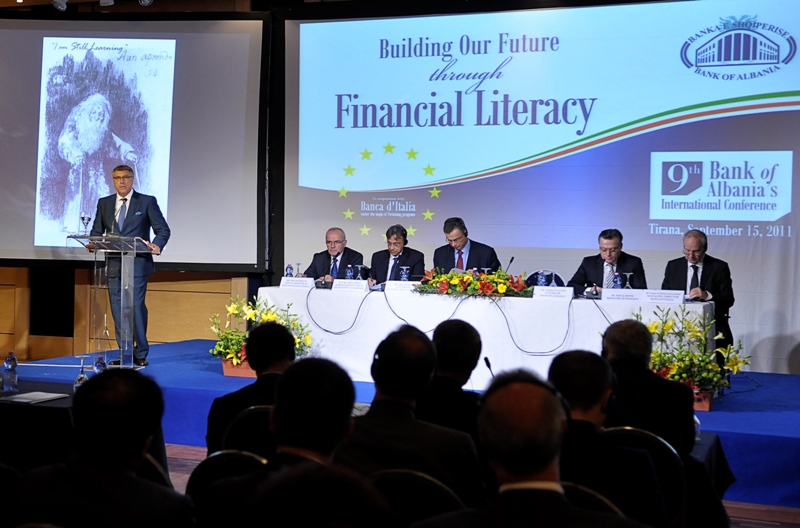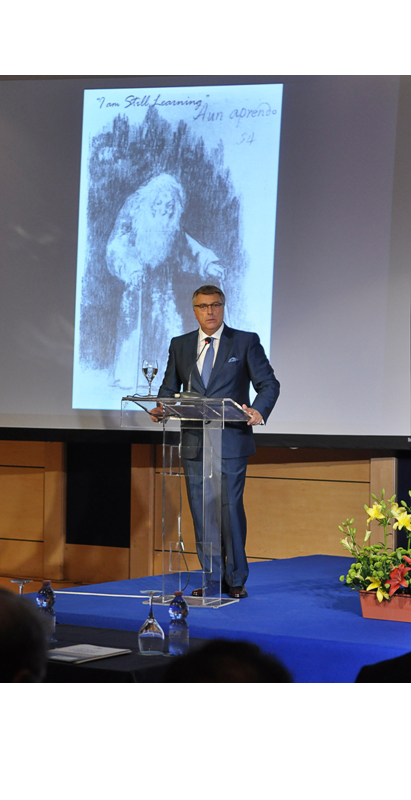BANK OF ALBANIA
PRESS RELEASE
Speech by Governor Ardian Fullani 9th Annual Conference of the Bank of Albania “Building our future through financial education”
Publication date: 15.09.2011
Honourable Minister of Finance,
Honourable deputy Minister of Education,
Your excellencies Ambassadors,
Honourable NBS Governor Soskiæ,
Honourable Mr. Passacantando,
It is a special pleasure for me to open the 9th conference of the Bank of Albania which this time is dedicated to financial education. I take this opportunity to wish a warm welcome to all the participants in this room and in particular to our foreign guests.


If you asked me directly what I mean by financial education, I would summarise it as: the ability of consumers and investors to understand financial concepts and products; ability to understand how to protect oneself against unwanted developments; ability of people to make sound decisions about their money in accordance with their life's circumstances.
Financial education should start with understanding the role of finance in a free market economy. Finance 'lubricates' the economic growth process. It also provides opportunities for all those who do not have sufficient financial resources. In 1911, the renowned Austrian economist Joseph Schumpeter said: '...that the structure of modern industry could not be erected without finance, that it makes the individual to a certain extent independent of inherited possessions, that talent in economic life rides to success on its debts' even the most conservative orthodoxy of the theorists cannot well deny.'
If you asked me why is financial education important, I would say it in these words: because it contributes to Albanians' financial welfare.
The more literate we are financially, the more capable we are to make decisions that contribute to our improved welfare. This is true for everyone, regardless of who we are or where we come from. As Friedman, the Nobel prize winner, says: 'Economic freedom is an essential condition for political freedom.' Our exercising rights that result from economic freedom would be unavailing in absence of financial literacy and equality in the marketplace. This implies not only the same information at the same time, but also the capacity to use this information.
Finances create an added value not only for the rich, but also for the entire society. It is necessary to create equal access for all citizens. Equal access to finances and equality before the law are the foundations of modern market economy. Finance and financial education walk side by side. While literacy may turn a poor man into a rich man, illiteracy, on the other hand, may conduct a rich man into misery. Finances are dangerous when you are not financially literate enough. That is why I consider this conference as highly important.
The Bank of Albania has devoted constant attention to financial education. Our education agenda is integral and comprehensive both in terms of geography and age groups, full of interactive elements and modern communication methodology. Furthermore, I would like to refer to some of the elements that constitute the philosophical grounds of our educational work.
First, I would like to recall that financial welfare is inextricably related with the country's economic progress.
It has been already proven that individual's welfare is proportionate to economic activity and prices of financial assets. The cause-effect relation is true on both directions. Our economy and financial institutions are strong when revenues and wealth grow. Financially healthy individuals are inclined to increase their consumption and, therefore, boost their spending, consequently pushing the economy forward. Moreover, financially successful people boost lending potential by channelling their savings into deposits.
Therefore, they are in a position to have access in crediting by the banking system, giving life to new businesses which, in turn, provide higher employment and welfare.
To most of the people, having a job and a salary or estate is essential to personal financial welfare. However, the fact that you may have a job, or a salary does not imply that you automatically have the capacity to make wise decisions on effective money utilisation.
This is the point where our relation with financial education is subjected to the test of the truth. Is this test passed? The sub-standard credit crisis in the US revealed that individuals in most cases did not manage to pass this test. Consequently, the debt load on individuals grew even heavier, while access to crediting became tighter, resulting in a big risk for their financial future. A similar analogy may be drawn for lending in foreign currency in some Eastern European countries.
Secondly, financial education should be seen as a public good that brings about positive externalities to the society. It not only increases individuals' financial welfare, but also affects directly economic policy efficiency undertaken by relevant authorities.
The more-educated the public, the higher economic policy efficiency is. Maintaining inflation and economic activity under control is almost impossible in a society ailing from financial illiteracy. Macro-economic balances are achieved and maintained through monetary and fiscal policies instruments. The society needs to be aware of these instruments, understand them, evaluate stimuli and incentives, and properly respond to them.
The important role of consumer behaviour for the policies success is clearly evidenced in the 'rational expectations' theory. A simple intuition behind this theory is that rational individuals shape their expectations using the available information optimally. They respond to new information by adopting their behaviour to maximise welfare.
In this case, individuals 'equipped' with financial literacy read and understand developments in economic policies and respond to them rationally. This mutual understanding would drive the economy towards the desired direction. The central bank adjusts its policies in response to the actual behaviour of agents, who would adjust their behaviour in line with the central banks policy. For this interaction to happen, both the public and the central bank need to speak the same language and understand each other unequivocally. Money management needs this two-way understanding and the active role of individuals. Consequently, the trust and confidence of the public is earned, monetary policy objectives are achieved and its reliability is enhanced.
Thirdly, I would like to underline that financial education of individuals establishes a more stable society on one hand and a stronger and secure banking system on the other.
Efficient and ongoing financial education is a path trotted by millions of individuals and families in their endeavour to achieve financial goals and accumulate wealth.
The positive effect of this process is reflected in a stronger economic and financial stability for the entire society. The banking system has its role to play in this process, mainly through lending to businesses and households. As a regulator, the Bank of Albania gives its share of contribution ensuring that banks strictly abide by legal and regulatory obligations in relations with their customers. On the other hand, financially literate customers, contribute to the development of the banking system with their increasing demand for financial products and services. Therefore, the result is clear: higher efficiency, lower charges, better services and healthier and safer banking system.
Fourthly, I would like to highlight that financial education, over time, improves the living standard in the long run, including retirement age.
In a recent analysis, the essential reason why an individual needs to amplify his financial literacy is that this investment will help him to reach his money management objectives.
Although personal objectives may vary from an individual to another, on financial education point of view, improvement of society's living standard is guaranteed and confidence for the future is boosted.
Financially literate individuals, are capable to make healthy financial plans, from an early stage of their career. Their knowledge enables them to plan their finances for retirement, children's education and accumulation of financial assets. These individual behaviours, seemingly irrelevant, bring about great benefits in the national perspective.
Fifth, I would like to underline that financial education is a long-term process, extended over time, and that the presence of specialised institutions is indispensable.
Although in financial crisis individuals incur large damage, they continue to be involved in future crisis. The number of individuals, who are familiar with interest rates they either receive or pay in financial transactions, remains low.
The same may be said about investment strategies, financial risk identification and assessment, and other elementary money management concepts.
Many people do not think in financial terms and do not perceive accurately profits and costs resulting from bank loan use, or wealth-related effects originating from home ownership and other similar long-term assets.
Reasons behind this behaviour are understandable and related to the fact that the majority of the society acquires information circumstantially, hoping that the actual failure becomes a lesson for the future.
One way to eradicate circumstantial learning is the introduction of financial reading at an early stage of education. In this view, I would proudly say that, the Bank of Albania has provided an outstanding contribution. Allow me to briefly make an résumé of our work in this aspect.
The first strategic station of financial education provided by the Bank of Albania was needs assessment and identification of training priorities. From this point of view, we assessed that it was indispensable to open the Bank 'de facto' to the public. More frequent communications with the market and its important participants, as well as periodic explanations of monetary policy decision-making and risks balance related to inflation and financial stability, are some initiatives that we consider as a very effective education process.
I am proud to say that now we have:
-
A public opinion that builds up expectation as regards our decision-making;
-
A media sector, which has admirably enhanced understanding, interpretation and expectations related to our decision-making;
-
A banking sector, which reads accurately and responds with high flexibility to the direction oriented by us;
-
A qualified public critique, where Bank of Albania finds a mirror of alternative opinions on its adopted decisions and practices.
Another important aspect is the identification and division of the population according to their demographic, geographic and cultural characteristics. For us, financial education is a public good intended for all. In compliance with the best international experiences, we identified financial education for young people as highly important, targeting not only students but also their educators. Its practical realisation has been a complex process requiring adequate human and financial resources.
For that purpose, the slogan adopted by us is very meaningful: 'Education may be costly, but it is priceless'. The implementation methodology is widely known: meeting face-to-face, interactive games that intrigue children's imagination, a series of publication with a flexible level of difficulties, training of teachers of economy, and a tour in various schools of the country.
In this regard, I would like to point out to the recent contribution of the Bank of Albania to high-school students for the book on: 'Personal finance in your hands', which is conceptualised as an elective subject for high schools.
Honourable participants,
Education is a never-ending process. Learning is lifelong. It is deep, immense, and comprehensive. Therefore, I have to say that in spite of what we have done so far, we still have a long way to go. The Bank of Albania deems as imperative the drafting and implementation of a national strategy on contemporary financial education. The Bank of Albania stands ready to join any initiative at national level, which aims at promoting literacy across the country.
Thank you!

 Linkedin
Linkedin
 Twitter
Twitter
 Youtube
Youtube
 Facebook
Facebook
 Flickr
Flickr
 RSS
RSS
 Subscribe
Subscribe
 Feedback
Feedback